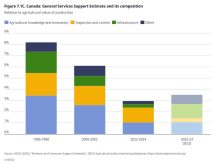The Federal Court of Appeal has res tored the federal government’s “gag order” against the Canadian Wheat Board (CWB).
It means the CWB isn’t allowed to spend money advocating to keep its single-desk marketing powers. However, the rul ing says individual CWB directors and even staff can speak publicly in support of single-desk selling as long as it doesn’t use CWB funds to advertise that support.
The June 2 3 rul ing by Justice Marc Noel has even wider implications, according to the Western Canadian Wheat Growers Association (WCWGA). It shows Ottawa has the legal authority to impose an open market without changing the CWB act, he said.
Read Also

Best before doesn’t mean bad after
Best before dates are not expiry dates, and the confusion often leads to plenty of food waste.
“This is precedent setting, or at least we hope it will be. The Appeal Court has found the federal government has quite a bit of discretion in directing the affairs of the CWB.”
– BLAIR RUTTER
“This is precedent setting, or at least we hope it will be,” WCWGA executive director Blair Rutter said in an interview last week. “ The Appeal Court has found the federal government has quite a bit of discretion in directing the affairs of the CWB.”
Justice Noel, quoting from the CWB act, states in his 25-page written decision that Sect ion 18(1) of the CWB Act allows the Governor in Council (cabinet) to issue directions “’with respect to the manner in which any of its (CWB) operations, powers and duties. . . shall be conducted, exercised or performed.’”
The WCWGA has long held the same view and has recommended the government order the CWB to issue export licences without forcing farmers to buyback their grain from the CWB first, effectively creating an open market. The government should test its powers and force the CWB into an open market, Rutter said.
“We maintain a majority of farmers support a voluntary wheat board. It’s not as if the federal government is acting without moral authority here to go to bat for those who support choice,” Rutter said.
The CWB act also says any change to the wheat board’s mandate must be approved by farmers through a vote. The courts have ruled the government can’t order an open market for barley without first amending the legislation and it can’t do that without the support of opposition parties.
Liberal Agriculture Critic Wayne Easter disagrees with Rutter’s interpretation, saying the ruling applies only to the question of whether the CWB can spend money to promote single-desk selling.
“I do not believe it has any relationship at all as to how the board operates in terms of procedures,” he said.
If the latest ruling stands, Easter said a Liberal government would amend the CWB act to ensure the letter of the law follows its spirit, which is for the CWB to be run by and accountable to farmers.
The Liberal government passed amendments to the act in 1998 specifying the CWB is not a Crown agency and would be governed by a 15-member board, including 10 farmer-directors, elected by farmers.
Nat ional Farmers Union (NFU) president Stewart Wells said the government’s order is an insult to farmers, the majority of whom support single-desk selling based on last fall’s CWB election results.
The CWB’s board will consider July 23 whether or not to seek leave to appeal the ruling to the Supreme Court.
“We’re certainly disappointed,” CWB chair Larry Hill said. “This goes against the views of farmers.”
In the CWB’s 2008 farmer survey, 77 per cent said farmers, not the government, should decide the CWB’s future.
Hill said because staff are paid by the CWB and directors receive a per diem, the ruling will make it more difficult to defend the single desk. “It calls for discretion, there’s no doubt about that,” he said.
Hill also maintains the spirit of the amended CWB act is to put the operation of the CWB into farmers’ hands.
Hill said he was surprised the Appeal Court overturned Justice Roger Hughes’ June 19, 2008 ruling, which found the government’s order to be illegal and unconstitutional.
Justice Hughes didn’t buy the government’s argument the order was about saving itself or farmer money.
“It is entirely clear, therefore, that the (government) directive is motivated principally
to silencing the wheat board in respect of any promotion of a ‘single-desk’ policy that it might do.”
In its appeal the government agreed its motivation is to silence the CWB so it doesn’t undermine government policy.
Justice Noel acknowledged CWB is no longer a Crown agency, but wrote that under the current legislation when there’s a dispute between the CWB and the government, the government has the legal power to prevail.
Agriculture Minister Gerry Ritz said he was pleased by the decision.
“We’ve always believed that farmers’ money should be spent on marketing wheat and not the wheat board and we are glad to see the courts agree,” he said in an e-mail. [email protected]















